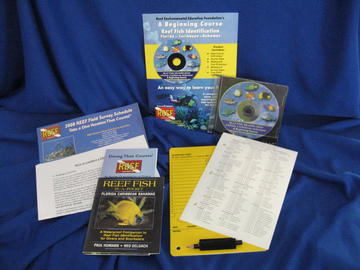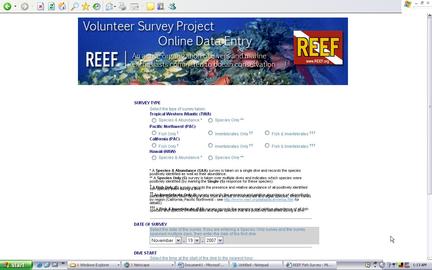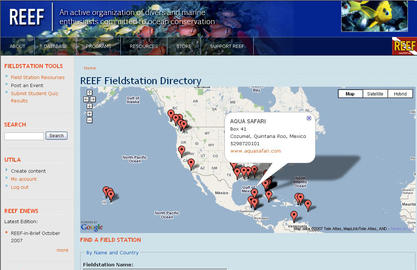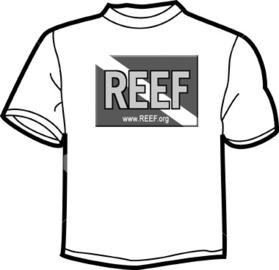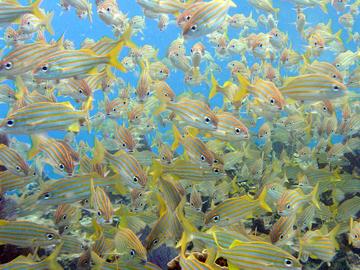Author: Dr. Christy Pattengill-Semmens, Director of Science
REEF Director of Science, Dr. Christy Pattengill-Semmens, and Grouper Moon Scientists, Dr. Brice Semmens (NOAA) and Dr. Scott Heppell (Oregon State University), participated in the Gulf and Caribbean Fisheries Institute (GCFI) meeting earlier this month in the Dominican Republic. This annual meeting brings together scientists, fishermen, resource agency managers, and marine conservation organizations to present and discuss current topics and emerging findings on coral reef resources of the tropical western Atlantic waters. Christy presented a summary of 5 years of fish monitoring on two modified reef areas off Key Largo, Florida: the Spiegel Grove artificial reef and the Wellwood grounding restoration (see next month’s edition of
REEF-in-Brief for more information on these projects). Brice was an invited speaker in the special session on Nassau grouper, presenting an overview of the conservation status of the species. During the Spawning Aggregation session, Brice also presented changes in the average size of Nassau grouper that are visiting the Little Cayman spawning aggregation site since it was protected from fishing in 2003. Scott presented a poster summarizing cleaning station research that the Grouper Moon team has been conducting on the Little Cayman spawning aggregation site. Other presentations that included REEF data included a talk by Dr. Todd Kellison from NOAA Fisheries on trends in commercial species abundances in Biscayne National Park and a talk by Nicole Cushion from University of Miami on patterns of abundance in grouper species in the Bahamas.
Author: Joe Cavanaugh
In an Enews article last May, I wrote about a collaborative effort between REEF and the Bahia Principe Resort in Akumal, Mexico. The Resort has been working with ReefAid ever since Hurricane Wilma (2005) did major damage to the reefs just in front of the resort, in an effort to study, protect, and restore these reefs. I was originally invited down to conduct a fish census on a large patch reef area off the beach from the property. The destruction to the inshore reef during Wilma was severe and ever since, Bahia Principe has worked with ReefAid to restore this patch reef area, establishing a protected zone around the most hard-hit areas. Part of Bahia Principe's long-term plan is to create a mitigation plan for future storms and to educate guests about ways they, too, can help protect the reefs. The Hotel Gran Bahia Principe is the Yucatan's largest resort complex, and there are currently 14 such resorts worldwide. After our last visit, ReefAid's Founder, Eric Engler and I co-wrote a protection and monitoring plan for the Resort that included periodic roving diver surey assessments, special signs and enforcement of no-swim areas, a coral nursery, and coral and invertebrate monitoring using another non-profit's methodology (ReefCheck).
On our last trip a few weeks ago, Eric and I received Reefcheck training over two days with Gabriela Georgina Nava Martinez, learning their survey methodology. Gaby also taught a Reefcheck class to the Bahia Principe dive staff , their onsite turtle rescue non-rpfit, Ecologica Bahia, and some of the Resort public relations personnel.. Bahia Principe is now a REEF Field Station and is close to becoming an educational center for REEF, teaching fish ID classes and training Resort guests in how to conduct fish surveys. Resort staff will soon routinely conduct Roving Diver Surveys of both the protected area and the offshore reefs frequented by multiple dive operators. Additionally, Reefcheck will train the dive staff to conduct 3-4 surveys per year at first to form a baseline assessment of the inshore protected reef. And finally, this year REEF is running a Field Survey to Bahia Principe (May 17-24, 2008). Please see our Field Survey page on our website at http://www.reef.org/fieldsurveys/schedule to learn more about our upcoming survey and how to participate.
The collaborative efforts between our three non-profits in Akumal represent a proactive involvement among multiple stakeholders to protect a critical resource, one that is very susceptible to damage from development and excessive tourist pressures. The ultimate goal of this synergistic, cooperative effort is to protect a large inshore reef area (see images) and improve the reef integrity with the addition of well-placed coral recruitment modules. To be candid, much of the Mexican Riviera is slated to be developed by an increasing number of resorts, most with requisite golf courses. And there are other environmental concerns in addition to the coral reefs offshore that form part of the Mesoamerican Barrier Reef such as all the cenotes (sink-holes) with their endemic terrestrial and aquatic species; the crucial watershed provided by the cenotes; loss of mangroves; the regional rainforest cover that is in jeopardy; excessive nutrient loading from all the resorts and urban development; not to mention the cultural world heritage significance of the Mayan communities and archaeological sites. However, the good news is that if Gran Bahia Principe is voluntarily willing to adopt special protection measures for their resort, these may serve as a "eco-friendly" archetype for other resorts in the region. This partnership building between organizations at the regional and international level bodes well for the adoption of some conservation plans for the area. Whether the proposed regional development can be slowed to a sustainable level is another story that time will tell.
If you are interested in learning more, here is an excellent summary article on some of the initiatives between resorts and non-profits working to preserve the Mesoamerican Barrier Reef from the NY Times last week. http://travel.nytimes.com/2007/06/24/travel/24headsup.html?emc=eta1
Author: Leda A. Cunningham
On October 31, while many of you donned witch's hats and goofy masks, the REEF team suited up in Diving That Counts! t-shirts and made the annual pilgrimage to DEMA Show 2007, the largest dive industry trade show. DEMA was again held in Orlando, Florida, allowing local volunteers Mike Phelan, Tom Isgar, Dave Grenda, Lillian Kenney, and Nancy Eickelmann to generously donate their time in helping at the REEF booth. Fall interns Catherine Whitaker and Lauren Finan were rock stars as REEF ambassadors at the show by promoting the Volunteer Survey Project among attendees, helping recruit new Field Stations and selling REEF merchandise. Many thanks to Tom Isgar for donating four marine life prints to a daily raffle at the REEF booth.
One notable difference at DEMA this year was the undercurrent of environmental awareness among both exhibitors and attendees. REEF Executive Director, Leda Cunningham, co-led a workshop on using eco-activities (like the REEF Volunteer Survey Project) to increase diver acquisition with Project AWARE Director Jenny Miller-Garmendia. More than 12 organizations - non-profit, government, small business - have formed an alliance to serve as a resource for eco-activities and environmental education to the dive industry. We were honored to meet with White House representative, Gerhard Kuska, DEMA President, Tom Ingram and others with an interest in seeing this "Blue Diver Alliance" grow into active partnerships with the dive industry.
From the dive industry's perspective, the environment sells. Recent market research shows that the target dive consumer is the baby-boomer, for whom the environment is an important factor in their consumption decisions, including whether and where to go diving. Many exhibitor-sponsored seminars focused on practical strategies for marketing to the eco-conscious customer; one even demonstrated ways that a dive shop might "green" itself by, for example, using bio-diesel in its boats or installing energy efficient appliances. REEF continues to work with dive industry members in promoting the Volunteer Survey Project as a way to recruit and retain divers while helping collect important underwater information to help preserve the marine life that divers want to see. REEF survey materials like Starter Kits and the new home study DVD course (read the press release here) and the Field Station program (visit www.REEF.org for more info) are tools REEF uses to provide incentives to dive shops and other industry members to get involved with REEF.
REEF is excited to be working closely with the dive industry as DEMA launches its new "Be A Diver" campaign (January, 2008). We look forward to welcoming a new wave of environmentally engaged divers and training them to better understand and preserve marine life.
Author: Leda A. Cunningham
By popular demand, REEF has adapted its classrrom course into a home study DVD course package for beginning "fishwatchers" in the Caribbean, Florida and Bahamas.
Click here to read the press release;
click here to purchase the DVD course.
This would make an ideal holiday gift for your favorite fishwatcher!
Author: Dr. Christy Pattengill-Semmens, Director of Science
The long wait is finally over! REEF is proud to announce the launch of an expanded online data entry interface that now includes surveys conducted in the Pacific (California – British Columbia) and Hawaii regions. Surveyors in these regions can now enter data online and enjoy quicker processing time to view their data. With more than 2,000 survey forms coming in to REEF HQ each month, this expanded service will both improve efficiency and reduce rising costs of processing data. The program will eliminate many of the common clerical errors and will flag potential species misidentification based on existing REEF sightings data. REEF originally launched online data entry for surveys conducted in the Tropical Western Atlantic region (includes East and Gulf Coasts of US, Caribbean, Bahamas, and Bermuda) in February 2005. Here are answers to some of the most common questions
When and how?
Starting today, members can go online to http://www.reef.org/dataentry and enter data for surveys conducted anywhere in these Volunteer Survey Project regions. You will log in using your REEF member number and last name.
Will the data immediately be added to the REEF database?
No, similar to data submitted via paper scanform, REEF staff will run the data through error checking programs first. However, overall processing time will be greatly reduced.
Will I still be able to submit data using the paper scanforms?
Yes, REEF will continue to provide and process paper scanforms. However, beginning in 2008, REEF will charge a nominal fee per paper scanform to cover rising costs in processing these paper forms.
A very big thank you to Dr. Michael Coyne, REEF’s longtime database programmer and overall IT guru, for making this new program a reality, and to stellar REEF volunteers Janna Nichols, Liz Foote, Carl Gwinn, Herb Gruenhagen, and Janet Eyre for their help in beta testing the program.
To find out more, visit http://www.reef.org/dataentry/information.
Author: Dr. Christy Pattengill-Semmens, Director of Science
As we announced in the last edition of REEF-in-Brief, the REEF website recently underwent construction. To get the most out of the new REEF.org, REEF members need to become registered users. Registration is easy: with your REEF member number handy, click here to register. If you have misplaced your REEF member number, click here to look it up. If you are not yet a REEF member, joining is free and easy: please click here to join.
Here are a few of the new features on REEF.org.
-
Once you are logged in and you are a REEF surveyor, you will be able to view your own data summaries as well as a brand new REEF Survey Log report, which lists each survey that you have conducted along with all of the details about the dive and the total number of species that you saw. To access these reports, click on ‘My Data’ on the left hand panel.
-
Interactive discussion boards, including “ID Central,” a place where you can post identification questions and images of unknown critters for others to comment on, as well as a “Trip Reports” forum and a General REEF Discussion Board. Content on the forum is available for all to view, but you must be logged in to the Website in order to post a comment to any of the topics.
-
A searchable map of REEF Field Stations is now available, enabling you to locate all of these great locations that “Speak Fish”.
-
A REEF Events Calendar includes information on upcoming REEF classes and organized survey dives posted by our Field Stations, as well as events hosted by REEF HQ and other partners.
-
Learning resources including quizzes and galleries are back. These online guides are a great tool when first learning or reviewing the creatures found in the different REEF Volunteer Survey Project Regions.
We hope that the new REEF.org makes it easier and more enjoyable for you to participate in Diving That Counts! Feel free to contact us if you have comments, suggestions, or if you encounter a problem with any of the new features.
Author: Leda A. Cunningham
REEF will be making changes to the REEF Store over the next few months in an effort to streamline order processing and provide REEF members with the highest quality merchandise. We will keep you posted as these changes occur. A few highlights:
1. The apparel section of the store is temporarily unavailable. Please look for unique REEF apparel in January.
2. Starting January 1, 2008, REEF data scanforms will cost $0.50 each plus shipping in survey regions where online data entry is available (Tropical Western Atlantic, Pacific, Hawaii). Online data entry allows volunteers to more efficiently submit and view their data and allows REEF to focus its resources on improving the Volunteer Survey Project. Paper scanforms will still be available at no cost to volunteers without internet access and participants in REEF-led activities including AAT projects and Field Surveys.
3. We will be moving towards shipping all orders via USPS flat rate, Priority Mail unless faster shipping is required (extra charge).
Please keep an eye on the REEF Store for more information.
Author: Joe Cavanaugh
REEF is asking any interested REEF members to submit to us a
Field Survey T-shirt design for our upcoming 2008 season. Those of you who have participated in the past on a REEF Field Survey know that you receive a t-shirt as part of your participation in the program and every year we have a different design. There are only a couple of guidelines for you. Our new REEF Shirt must incorporate our REEF flag with our slogan, Diving That Counts! (I will send interested parties the jpeg file upon request). You do not need to incorporate the dive flag directly into the design, it may simply be on the front breast pocket of the t-shirt, for instance, with your design on the back and in this case, no need to ask
for our logo, we'll take care of that.
You should keep in mind our mission as stated on the top of our homepage, and our mantra, "diving that counts." Also please keep in mind that REEF actively surveys in 5 regions, not just the tropical western Atlantic. Please send your submissions to
joe@reef.org, making sure they are in an easily readable format such as a jpeg file (preferred). Please send all entries in by Dec. 31, 2007.
Depending on the number of submissions we receive, we may have our members vote on the winner in January of 2008. Past t-shirts have had fish images, divers surveying, cartoons depicting divers surveying with witticisms, watercolors of fish, etc. Most importantly, our t-shirt design should incorporate the conservation-based focus of our Field Survey Program.
Thanks in advance for your participation and our staff will look forward to your entries. First prize will be a signed and framed 2008 Paul Humann print of two beautiful Eagle Rays.
Field Survey Season 2008 - 5 Spaces are still available for our Turks and Caicos Liveaboard on Aggressor II, April 19-26, 2008.
Please contact Travel for You at 1-888-363-3345 or Joe Cavanaugh at 305-852-0030. The 2008 Field Survey page will be completed shortly - please check back in a week for final content.
Author: Joe Cavanaugh
Okay, well not exactly. But now that I have your attention. We ARE counting something in REEF HQ's backyard, not fish, but birds! I have signed myself /REEF up for Cornell University's Lab of Ornithology Project FeederWatch, an annual survey of birds that visit bakcyard feeders in winter. I have known about this other great citizen science program for a couple of years and like many of you, my love for birds, equals my affinity for fishes. Last week, 4 painted buntings visited REEF's feeder for a little over a week! You can see my fuzzy picture of a couple of them at the feeder from afar in one of the attached photos. This prompted me to go online and investigate Cornell University's FeederWatch Program further. From their homepage you will read, "FeederWatchers periodically count the highest numbers of each species they see at their feeders from November through early April. FeederWatch helps scientists track broadscale movements of winter bird populations and long-term trends in bird distribution and abundance." Sounds a bit familiar doesn't it?
Spend a little time on their website and you will see that FeederWatch parallels REEF programmatically in a few significant ways: 1. Anyone can participate in North America, all different levels from beginners to experts; 2. We both begin participation by purchasing a starter kit, FeederWatch calls theirs a Participant Kit and it costs $15; 3. Both organizations have online Dataentry and tracking of individual participant data; 4. Similar absence/presence data, abundances, and distribution for both groups in addition to viewing individuals' data http://watch.birds.cornell.edu/PFW/ExploreData; 5. Both of our organizations utilize citizen science data to inform and assist scientists in assessing population abundance indices of important avian and fish species, leading to peer-reviewed publications and ultimately influencing species and habitat management decistions; 6. You can check on their database to see what birds are rare in your area and if there are any other FeederWatch stations near you, just as REEF members can check for fish sighting frequencies and dive sites that have been surveyed in our areas of interest.
I'm sure there are many more parallels I could draw for you, but you get the point. One important note and the reason I am submitting this article right now is that FeederWatch season runs from the the second Saturday in November through April and is a winter activity. For all of our temperate REEF members who are looking for something to count when you're not underwater, this is it! To learn more, check out their website at http://www.birds.cornell.edu/pfw/Overview/over_index.html.
Author: Leda A. Cunningham
If you plan to be in the Keys at the end of the month, please join us!
What: REEF Holiday Open House
When: Friday, November 30 at 5 PM
Who: Friends, family, members of REEF
Where: REEF HQ: 98300 Overseas Highway, Key Largo, FL (yellow conch house on the median)
Why: Educate the community about REEF conservation programs
Renowned photographers and authors Ned and Anna DeLoach will be on hand to sign books and CDs-perfect for holiday gift-giving! There will also be food, drink, raffle prizes and survey materials for sale. This holiday season, give a gift that counts!
Author: Joe Cavanaugh
As you can imagine, on any given day there is a lot that needs to get done at REEF HQ to keep all of our programs running. I want to take a moment to thank Jessica Morris for helping us out during October with miscellaneous,yet crucial tasks in the office. Jessica is a local SCUBA instructor and is eager to help REEF and learn what we're all about. She has already achieved her level 3 experience level and is ready to start surveying when she's not instructing. If any of our REEF members are down in the Key Largo area and in need of a SCUBA instructor or just want to dive with someone who is knowledgable about fish ID, you can reach Jessica at jessm82@hotmail.com. She is also a budding photographer and took the pics of the Dog snapper eating the trumpetfish that is posted on our online forum page at http://www.reef.org/forum. In the future, REEF hopes to provide opportunities for our members to assist us on various projects from their homes. But for now, if you're in the area and want to help out, just let us know and/or stop into REEF HQ for a visit. Meanwhile, we'll look for more surveys and great pics from Jessica this winter.






